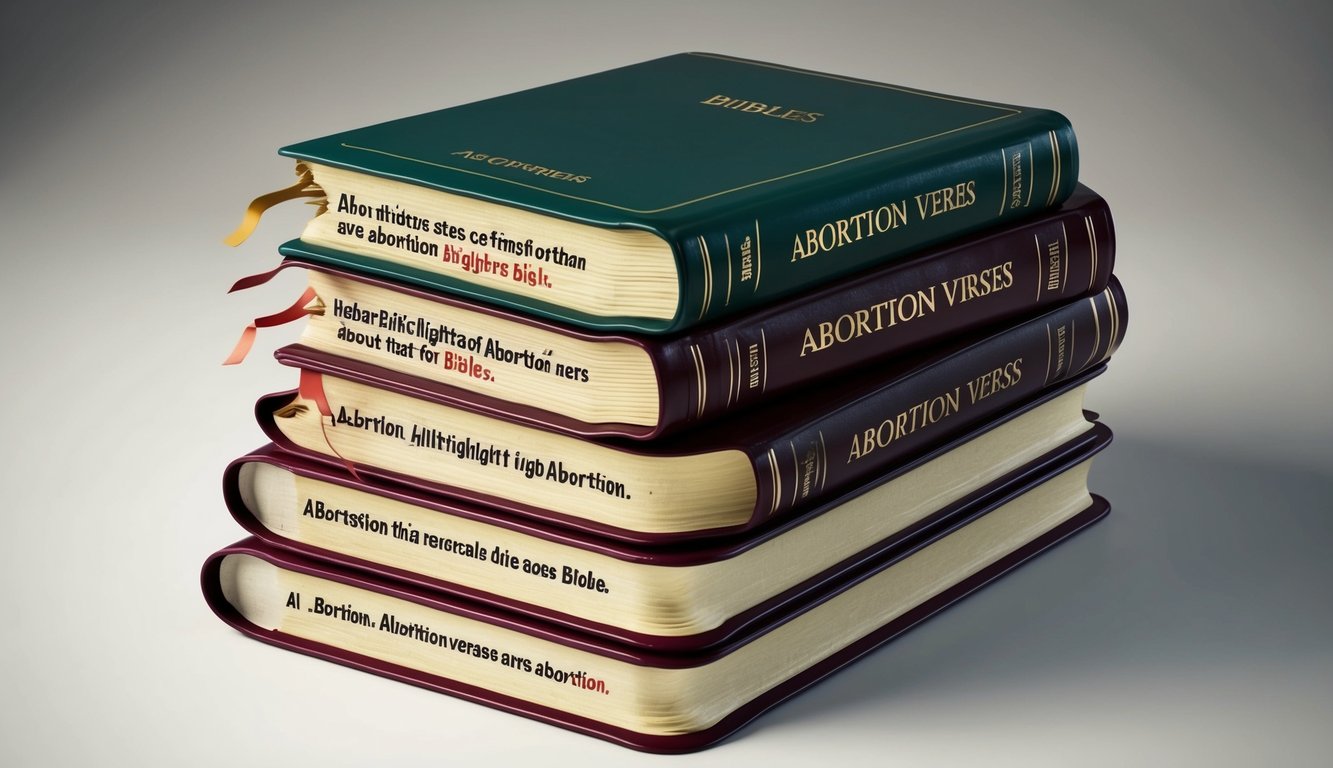Don’t Miss Out On This Unique Astrological Opportunity
Are you tired of spinning your wheels and getting nowhere? Simply put, you’re out of sync: you’re out of alignment with your astral configuration.
But: there’s a kind of map that can help you reclaim your alignment. Think of it as your own personal blueprint to success and happiness: a blueprint that will help you live your most amazing life.
Get started here.
The Bible presents various teachings and narratives, but its stance on abortion is not as clear-cut as some might expect.
In analyzing scriptures, you may find verses about the value of life and creation that can be interpreted in different ways.
The Bible does not explicitly address abortion.
Exploring the moral and ethical implications of biblical texts can lead to different interpretations.
Some people cite verses where God knows us from the womb as emphasizing the sanctity of life.
Meanwhile, others focus on the broader themes of compassion and justice in the Bible.
As you explore different viewpoints, you’ll find that interpretations can vary.
Some case studies and discussions examine specific passages that individuals use in debates, while others explore broader biblical themes.
Each perspective provides insights into the moral and ethical questions surrounding abortion and life.
Key Takeaways
- The Bible does not explicitly address abortion.
- Interpretations often focus on the sanctity of life and compassion.
- Discussions include varied viewpoints and biblical themes.
Biblical Views on Life and Creation
In the Bible, life is seen as a sacred gift from God, and creation is depicted as intentional and meaningful.
The scriptures highlight the idea that God is intimately involved in the formation and development of each person from the earliest stages.
The Sanctity of Human Life
The Bible emphasizes the sanctity of human life, portraying it as a precious gift from God.
In Genesis, it is said that humans are made in the image of God, which gives life an inherent dignity and value.
This belief underscores why life is held in high esteem within biblical texts.
“Before I formed you in the womb, I knew you,” says Jeremiah 1:5, reflecting God’s intimate knowledge and plan for each person.
Understanding life as divinely bestowed informs many Christian views against practices that could harm or end life, including abortion.
Conception and Formation in the Womb
Several biblical passages portray life as beginning at conception, with a significant focus on the process of formation in the womb.
For instance, Psalm 139:13-16 expresses the idea that God is intricately involved in the development of life before birth, emphasizing that He “knit me together in my mother’s womb.”
This view of divine craftsmanship underscores the belief in life’s sanctity even at its earliest stages.
The passage suggests that the act of forming life is not random but rather a deliberate act by the Lord, emphasizing a personal relationship with each human being from the beginning.
Moral and Ethical Implications

In discussions around abortion and biblical teaching, several moral and ethical issues arise, including the exploration of sin and innocence, the understanding of violence and murder, and themes of justice and forgiveness.
These points are deeply rooted in biblical texts and traditions.
The Concept of Sin and Innocence
When considering abortion through the lens of the Bible, the concepts of sin and innocence are crucial.
Some argue that abortion could be seen as a violation of the commandment found in Exodus 20:13, which prohibits murder.
This positions the unborn as innocent beings, making the action a significant moral dilemma.
Sin in this context often relates to guilt and moral accountability.
For some religious individuals, causing harm to an unborn child carries heavy spiritual consequences.
Yet, interpretations vary significantly.
Abortion may not be seen as sin by all traditions, and some emphasize the mother’s right to choose, highlighting the complexity of ethical views on innocence.
Violence and Murder
The Bible speaks directly against violence, and verses such as Proverbs 6:16-19 highlight actions that God detests, including hands that shed innocent blood.
Abortion can be seen as falling under this prohibition, considered an act of violence or even murder.
Understanding the Bible’s stance requires careful consideration of what constitutes “innocent blood.” For many, terminating a pregnancy challenges the prohibition against causing harm.
Yet others believe the decision should weigh the circumstances the mother faces, with emphasis on her health and autonomy, presenting additional moral considerations.
Justice, Retribution, and Forgiveness
Justice and forgiveness are deeply interwoven through biblical teachings.
The principles of grace and forgiveness allow room for nuance in the debate.
While some argue abortion demands retribution, others highlight God’s infinite grace as essential.
Forgiveness may play a vital role for those who view abortion as a sin.
Verses on redemption provide hope that, despite any perceived wrongdoing, God’s love and forgiveness are available.
These themes encourage mercy, understanding, and compassion, fostering a more holistic discussion around the moral and ethical complexities present in the abortion debate.
Case Studies and Interpretations
Understanding biblical perspectives on abortion involves examining specific passages and interpretations.
This section explores key verses addressing childbearing and harm, as well as legal views and consequences in scripture.
Some interpretations suggest that biblical texts emphasize the sanctity of life from conception, while others highlight distinctions between formed and unformed life.
Additionally, discussions on morality and justice in scripture often reference broader themes, including judgment and accountability, which are also explored in bible verses about hell.
These perspectives contribute to ongoing debates about the ethical and theological implications of abortion within religious communities.
Biblical Passages Related to Childbearing and Harm
One significant passage is Exodus 21:22-25, which outlines consequences for harming a pregnant woman.
If a fight leads to a pregnant woman being hurt, but no serious injury occurs, the offender pays a fine.
If serious injury follows, then the principle of “eye for eye, tooth for tooth” applies.
This highlights the value of life in the womb and potential repercussions of causing harm.
Other verses are interpreted to argue for the sanctity of life.
References to God’s role in creation and the pre-born child’s potential reflect beliefs about the significance of life from conception.
The interpretation of these verses continues to be a point of discussion among scholars and religious groups.
Legal and Punitive Measures in Scripture
Scriptural texts have been used to debate the legal implications of abortion.
The Judges in ancient Israel were tasked with enforcing laws and handling disputes, including those concerning family and bodily harm.
Examining scripture through legal contexts shows a mixture of leniency and strictness.
The concept of false witness appears in contexts where testimonies impact judicial outcomes.
It signifies the importance of truthful representation in legal matters.
Understanding legal measures in scripture gives insight into historical attitudes toward injury and punishment, particularly concerning harm to a pregnant woman.
The balance between fairness and severity in these laws offers a glimpse into the societal values of the time.
Frequently Asked Questions

The Bible addresses various subjects related to pregnancy and the sanctity of life.
It shares insights on forgiveness, moral guidance, and the consequences of certain actions.
What do biblical texts say about the sanctity of life in the context of pregnancy?
Biblical texts often emphasize the value and sacredness of life.
From the creation story in Genesis, human life is seen as a gift from God.
Verses like Jeremiah 1:5 highlight the idea of being known by God even before birth, underscoring life’s importance from early stages.
Are there any scriptures that discuss forgiveness in relation to terminating a pregnancy?
The Bible emphasizes grace and forgiveness for those who seek it earnestly.
For example, passages like 1 John 1:9 talk about confessing one’s mistakes and receiving forgiveness.
While not directly about abortion, such verses offer hope and peace to those seeking forgiveness.
How do various Bible translations approach the topic of life before birth?
Different Bible translations can slightly differ in their interpretations, but many uphold the belief of life’s sanctity before birth.
Verses like Psalm 139:13-16 are translated to reflect the intricate and sacred process of being formed in the womb, affirming life’s value even before birth.
What guidance does the Bible offer on dealing with unwanted or unplanned pregnancies?
The Bible offers guidance through verses that highlight compassion, support, and seeking God’s wisdom.
While not directly addressing unplanned pregnancies, verses encouraging mutual support and love, like Galatians 6:2, can be relevant for those facing difficult situations.
Does the Bible provide any insight into the morality of preventing conception?
The Bible doesn’t explicitly mention modern concepts like contraception, but some interpret passages about self-control and marital responsibilities as guidance.
Discussions on this topic often refer to broader principles found in texts such as 1 Corinthians 7, which talks about marriage and mutual consent.
Are there any passages in the Bible that interpret the consequences of causing a miscarriage?
Exodus 21:22-25 is often cited in discussions about the consequences of causing a miscarriage.
This passage refers to penalties if a pregnant woman is harmed, reflecting ancient legal views on protecting life and ensuring justice.
Interpretations can vary, but this passage is frequently discussed in biblical debates on miscarriage.



